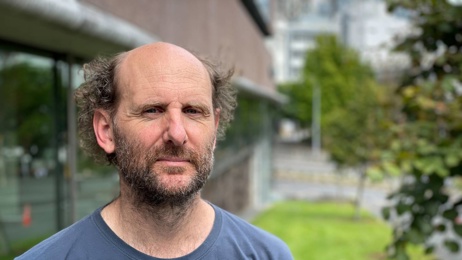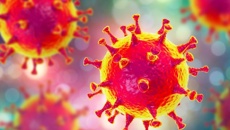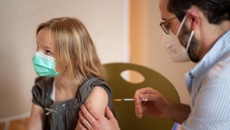Prime Minister Jacinda Ardern has addressed the "misinformation and conspiracy theories" among protesters as NZ recorded a record 22,152 new community cases of Covid-19 today.
Ardern says the protesters had been given ample opportunity to go.
"The protest has been at times violent, and fuelled by misinformation and conspiracy theories." It had also turned into a Covid-19 super spreader.
She acknowledged the police, saying today had been difficult.
Asked if she agreed with the approach up to that point, she said that had been for Police Commissioner Andrew Coster to decide. However, she said she believed there should be a review of whether more could have been done earlier to prevent things from reaching the stage they had.
Ardern said her view since that had been that they needed to leave, regardless of police enforcement action, "But you can see from the numbers involved, that [police] are working very hard to clear those who remain."
She said the aftermath would include checking whether Parliament's own security was sufficient - but she would be concerned about anything that felt as if it was distancing Parliament from the public.
Covid-19 Response Minister Chris Hipkins earlier announced there were also a record 405 people in hospital during the 1pm update.
There are currently 405 people in hospital with 10 people in ICU or HDU across New Zealand.
While case numbers continued to grow, the key metric health officials were focusing on was those that needed high levels of care such as hospitalisation.
The message to all New Zealanders was that high rights of vaccination were making a difference in how New Zealand was weathering the outbreak, Hipkins said.
Of the 405 people in hospital, 5 are in Northland, 56 in North Shore, 142 in Middlemore, 108 in Auckland, 37 in Waikato, 12 in Bay of Plenty, 5 in Rotorua: 3 in Tairawhiti, 1 in Hawke's Bay, 4 in Taranaki, 2 in MidCentral, 2 in Hutt Valley, 11 in Capital and Coast, 6 in Nelson Marlborough, 10 in Canterbury and one in Southern DHB.
The average age of those currently in hospital is 52.
The new community cases are in Northland (382), Auckland (13,231), Waikato (2,139), Bay of Plenty (1,270), Lakes (415), Hawke's Bay (273), MidCentral (367), Whanganui (56), Taranaki (261), Tairāwhiti (137), Wairarapa (91), Capital and Coast (1,115), Hutt Valley (473), Nelson Marlborough (272), Canterbury (1,033), South Canterbury (36), Southern (578), West Coast (15). The location of eight are unknown.
Today's new cases bring the total number of confirmed cases in the outbreak to 142,321.
All of the DHBs had now had 90 per cent uptake of the first dose of the vaccination.
More than 80 per cent of today's 22,152 community cases were detected by a Rapid Antigen Tests.
In the past seven days 7.7 million rapid antigen tests have been given out.
Access to RATs continued to progress across the country, Hipkins said.
Hipkins urged people to be patient while trying to access tests and more sites were being stood up.
There was no need to stock up on rapid antigen tests and tests were "literally arriving all the time".
The older your tests are the less accurate they are so we don't want people stockpiling, Hipkins said.
St Johns and Healthline had been reporting people using their services with "relatively mild symptoms", Hipkins said.
If people had mild symptoms, the advice was to stay home and ensure those services were left free for those that needed them.
For many people, with New Zealand's high rates of vaccinations, getting Covid-19 will be like getting the cold or the flu, Hipkins said.
For school organised activities, vaccinations were not required for children, Hipkins said.
We want to be clear that those kids participating in activities organised by the school don't need to be vaccinated, Hipkins said.
New Zealand had a very low mortality rate and that was thanks to the people who had worked at our border.
Working at the border, in MIQ, had taken a toll on those workers.
Yesterday there were nearly 20,000 recorded new cases, though director-general of health Ashley Bloomfield conceded the number of active cases - just shy of 100,000 yesterday - may only be a third or a half of the actual infections across the country.
There were 373 patients in hospitals with Covid-19 and nine in ICU, while hospitals were at 80 per cent occupancy and ICUs at 57 per cent occupancy.
Middlemore Hospital staffing levels were down 15 to 20 per cent, due to people either having Covid-19 or looking after other who'd tested positive.
Public health experts say that the peak will hit Auckland first, perhaps within two weeks, and then the rest of the country perhaps a week later.
Yesterday Bloomfield apologised to the 32,000-odd people waiting five days or more for the results of their PCR test.
He urged those awaiting results to undertake a rapid antigen test, and gave assurances that the tests will still be processed; 9000 had been sent to Australia over the weekend.
Surge testing capacity was meant to be able to handle 77,000 samples a day, the Government announced in late January, but the system came under intense pressure when demand was less than 30,000 a day.
This morning Hipkins told RNZ that the Government will seek answers around why the advice on test processing capacity was so wrong, but in the meantime the focus was on righting the wrong and getting results for those who were still waiting.
Hipkins added that the isolation period for cases and household contacts was being looked at. It is currently 10 days, but could be cut to seven days.
The Government is also looking at the traffic light system and vaccine pass, and whether they will still be useful after the peak of the Omicron wave has subsided.
But Hipkins said any decisions on mandates would be based on public health advice, not on any of the demands of the protesters around Parliament.
Anti-vaccine and anti-mandate protesters have been occupying Parliament for 23 days, clogging the surrounding streets with cars and trucks, but this morning hundreds of police descended on Wellington's CBD at 6am to take back the occupation.
Police say they have started towing cars, and are now moving to tow larger vehicles as they close in on Parliament - though they have yet to move in on the main protest area on Parliament's lawn.
Police faced protesters armed with homemade weapons such as pitchforks, tripwires, fire extinguishers and plywood shields. Some protesters also shined lasers at the police helicopter circling the operation from above.
Sixty people have been arrested and three police officers injured in the chaotic scenes this morning.
While police say the violent clashes and weapons are "disappointing" they are pleased with the number of people and vehicles that have voluntarily left the protest area this morning.
Take your Radio, Podcasts and Music with you









